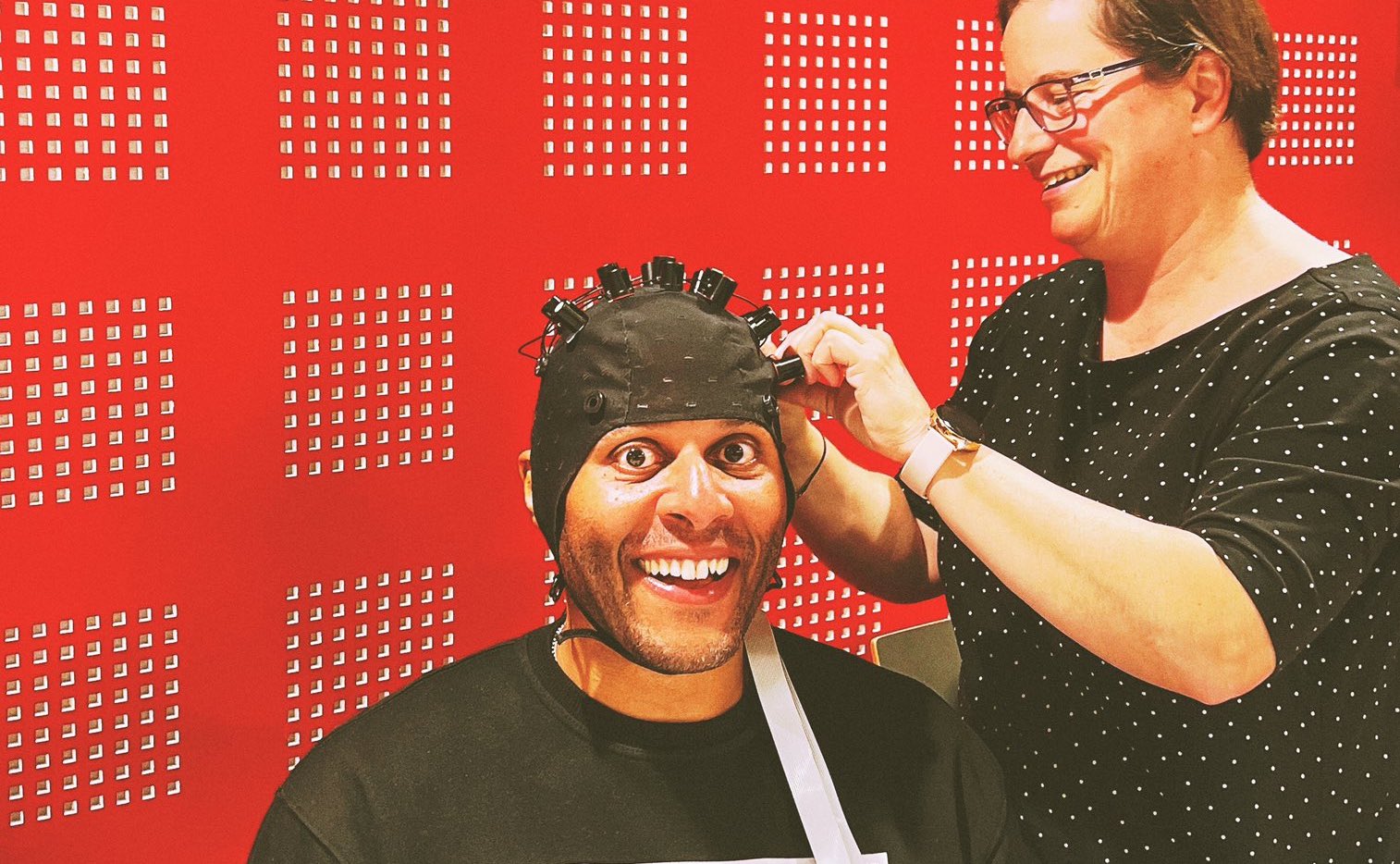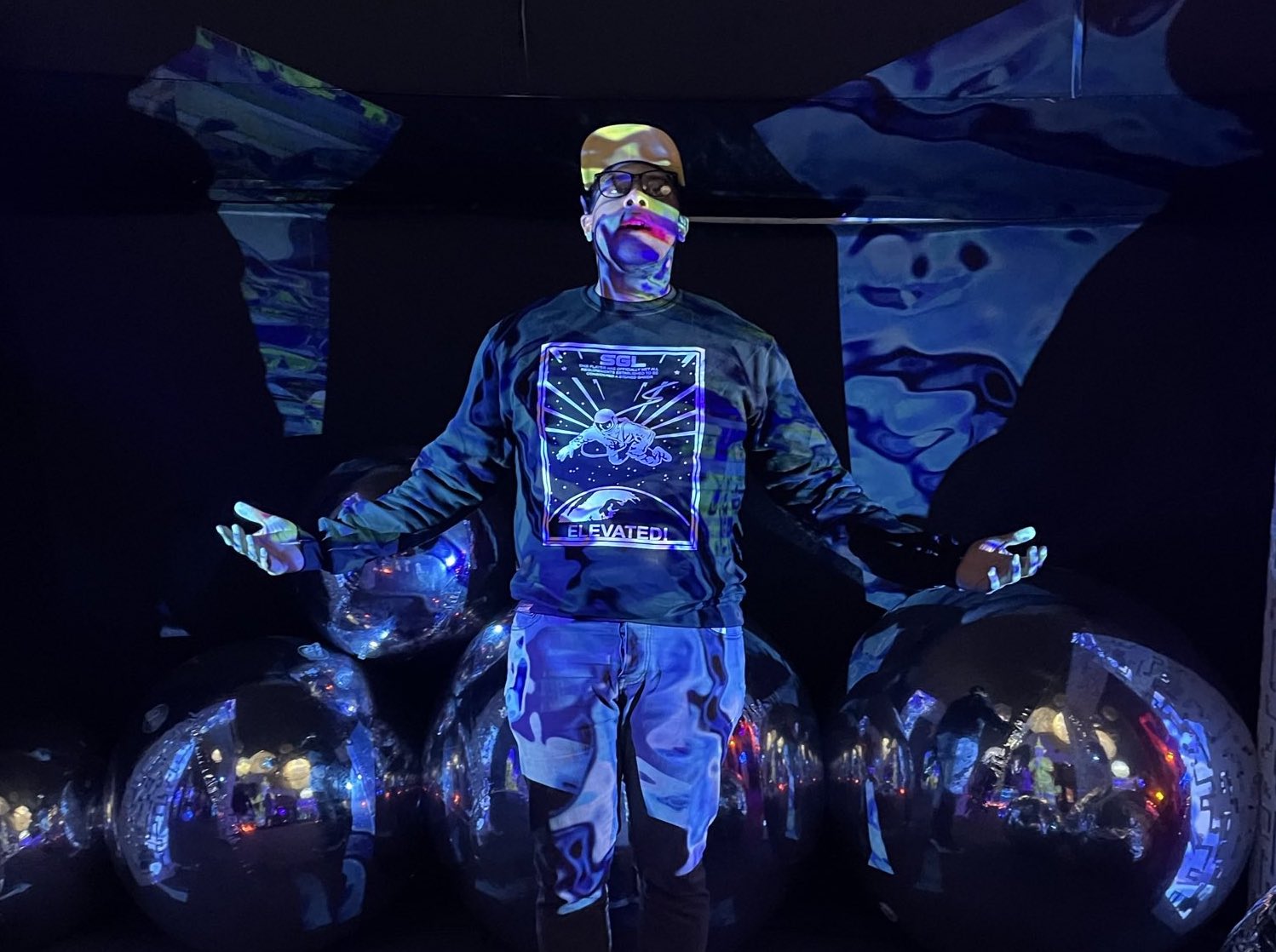When Zeus took shrooms for Snoop Dogg
Neuroscientist and psychonaut Zeus Tipado on how psychedelics and virtual reality intersect, what it has to do with Voodoo and Jesus Christ, and why the most mind-blowing thing here is the human brain.
Neuroscientist and psychedelic researcher Zeus Tipado stood, gaping, in front of 70,000 people. It was June 2016, he was on stage at the E3 conference - the world’s largest gamer event - and, for want of a better phrase, he was tripping balls.
“I was there as part of my seven-episode series on psychedelic science, for Snoop Dogg’s publication ‘Merry Jane’,” explains Zeus, clad in fluorescent-yellow-faux-fur. “I met this very cool programmer who had constructed a VR set up called ‘Envision’. It was specifically designed for people to go into while tripping on psychedelics and I’m like ‘well it just so happens that I’m on 5g of shrooms right now! Let’s try this thing.”
It was this experience, that Zeus describes as “overwhelming, but beautiful”, which set him on the extraordinary academic path he’s on now - becoming the first person ever to study the brain while on DMT (the main active molecule in South American psychedelic brew, ayahuasca)…in virtual reality.
Contemporary psychedelic research over the past few years shows, in Tipado’s opinion, one key thing: the concept of perception during a trip (the subjective effects, the actual trip itself, the extent of the trip, the intensity of the trip) correlates almost perfectly with the therapeutic benefits. So, the more intense an experience, the bigger and better the results, whereas sub-perceptual dose (ie. micro-dosing) doesn’t appear to have any beneficial effects, other than acting as a placebo. That being said, it’s also important to stay safe. While you would need to take 17kg of psilocybin mushrooms to get within 50% of a toxic dose, in a clinical setting you would typically only be given between 20 - 30mg of psilocybin (the active substance, not the weight of mushrooms) for a therapeutic dose. Other psychedelics, such as MDMA and ketamine, are more risky, as you can overdose on these at much lower levels.
“The wonderful thing about VR is that it’s only your imagination that holds you back. I had a fantastic experience and it made me realise what we’re using this for is ridiculous. Games with guns inside? Like we don’t already have enough gun violence in the world. I realised that VR with psychedelics has the potential to be amazing. And that’s what I've been researching ever since.”
But his path hasn’t always been as science-driven as it is today.
“I was born in Louisiana. My family’s Creole so they practice Creole voodoo,” he starts.
“I witnessed a lot of conjuring as a kid. Spirits being summoned through people,” he continued. “It was totally normal to me - I just thought that that's how reality operated. That there was this other realm that existed which can be accessed through certain very important people.”

Moving to Texas as an older kid, he had the shock of discovering that not everyone has such an easy relationship with altered states.
“When I left Louisiana, I found out there’s this other thing, ‘Jesus Christ’, that controls a large portion of society. The whole idea of religion and the altered states I’d been exposed to enthralled me. And then, in high school, I discovered Terrance McKenna: a world-renowned psychonaut and ethnobotanist. His way of talking about psychedelics and these inexplicable happenings in a very calm, scientific way intrigued me.”
It was then that Zeus decided he needed to learn more about psychedelics, specifically how and why they have psychoactive and reality-bending effects.
The study of psychedelics has recently become more accepted and accessible. Organisations like MAPS (Multidisciplinary Association for Psychedelic Studies) conduct Phase 3 studies into using MDMA to treat PTSD. As a result, MDMA-assisted therapy is expected to receive FDA evaluation in 2023. In the UK, clinics using ketamine for addiction and trauma have been set up. Breakthrough studies with psilocybin indicate enormous potential for healing treatment-resistant depression. A number of states in the USA have legalised certain psychedelics, paving the way for their wider use and research, but it’s far from a mainstream subject.
Although Zeus wanted to find out more, getting a Bachelors on in psychedelics wasn’t an option. So he studied psychology and religion at the University of South Wales in theUK to further his own understanding of the psychedelic experience, and altered states, as a whole.
It was there he tried psychedelics for the first time. Four grams of shrooms to be precise. (For the uninitiated, this is what’s called a ‘heroic dose’. It’s a lot.)
“I jumped into the ocean without any clothes on,” he laughs, recalling what he describes as a “really interesting” trip.
“It solidified my curiosity towards psychedelics. The trip was fantastic. I could feel all these colours, all these different emotions. The ceilings and walls were peeling back, but I was in control of everything. And then I look at this book lying on the floor - the Rigveda. It’s a giant book of Hindu mysticism, like 400,000 pages. It’s pretty sci-fi, talking about spaceships travelling through galaxies.There's this giant battle that happens, with chariots adorned in gold fighting in space. So the story goes, if the battle continues it'll just end all of humanity, it'll end everything. This deity called Shiva comes down as this giant badass, swords and hammers and knives, in full armour, and just freezes time. As I was looking at this cover, I felt like I was actually in the battle.”
I asked Zeus how he feels about that trip now - is there something to it? Does he think we’re all in this great universal battle and he was given insight into that?
He smirks. “I believe it’s just a result of my higher education. My brain created this really random scenario based on what I know. I was in the middle of dedicating four years of my life to learning about religion.”
Although not supernatural, Zeus thinks the brain producing these effects is astonishing, all by itself.
“The act of accepting light radiation from your eyes, then converting that light radiation to a chemical signal that your brain understands as ‘this is a black car’, or ‘this is a green bike’.... That process is incredible. The idea that our brain can create DMT aliens that we can talk to isn't that extraordinary to me. I’ve now discovered that the standard brain processes, and the processes you can access with psychedelics, are way crazier and infinitely more interesting.”

‘Set and setting’ as it’s called in psychedelic therapy, is vital for having a ‘good’ experience (which, according to psychedelic therapists, may still be very challenging). This refers to your mindset before and during the trip, as well as your surroundings. Medical experts using psychedelics as a treatment are absolutely emphatic about creating a calm, positive environment before taking psychedelics, using weighted blankets, music and lighting to do so.
In VR, as Zeus has discovered, your setting can be anything you like. And the effects of that hold tremendous potential.
“My research into psychedelics isn't therapeutic at all, it’s more about the perceptual changes. Why is it that a person can take a tab of paper and have their entire reality, reconstructed, readjusted and redefined, and then be perfectly fine the very next day? Why are we tripping? We still don't have a scientific explanation to that seemingly very basic question. But I believe by using VR to have precise control over a person’s environment, while watching how the blood in the brain is shifting on the top the cortical layers, which then allows you to make an accurate prediction as to what is happening deeper in the brain, can help us get closer to understanding how the brain works under psychedelics. This experience is something that can radically change your life. And I want to understand why.”
One issue that comes up a lot in the psychedelics industry is the potential ramifications of a largely white-dominating business taking psychedelic plants and indigenous healing practices from disenfranchised groups into a mainstream, western framework. But Zeus thinks widespread use could actually be beneficial to those groups, in the long run.
“When we take psychedelics, it unifies everything. Not just in a touchy-feely kind of way, but in the sense that regardless of if you're a refugee in Afghanistan, or you're a billionaire in Beverly Hills - you take an acute dose of psychedelics, and your brain will do the exact same thing. Areas of your brain that were once established sort of collapse, allowing these usually disconnected areas to connect.”
“There are many marginalised communities, and the needs for one don’t necessarily reflect the needs of others. But the concept of “ego-dissolution” or “oceanic boundlessness” in psychedelics, which essentially means one loses their sense of self for a greater understanding being integrated in a much larger community or presence, is a unique and valuable trait of psychedelics. This could help create a political stance that doesn’t rely on invisible divisions made purely from social constructs. The whole basis of marginalisation in communities. Psychedelics are known to collapse these divisions in rather profound ways and forces us to realise there’s more genetic variation within races than between races.”
So, should everyone take psychedelics? There are risks that come with the experience, particularly for those with mental health conditions. But they aren’t quite what we’ve been led to believe.
“There are dangers with everything, and there are some people who shouldn’t take them, for sure. But the dangers surrounding psychedelics can be overcome with better healthcare. We should question why they’re generally illegal. It’s not for our safety, because harms would be drastically reduced if they were legal,” says Zeus.
“I think psychedelics should be incorporated deeper into the human experience and human culture. As Terence McKenna would say, going your whole life without taking psychedelics is like a person never reaching puberty. I can't imagine what it would be like to be a person going into the grave without having a psychedelic experience. When used in the right way, they can put you on a path to better your life, which could put us all on a path to a better world.”
The Lead is now on Substack.
Become a Member, and get our most groundbreaking content first. Become a Founder, and join the newsroom’s internal conversation - meet the writers, the editors and more.

